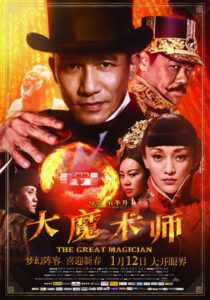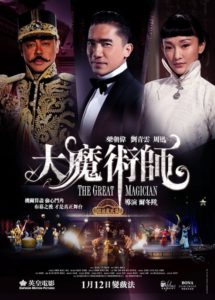The Great Magician
大魔术师
Hong Kong/China, 2012, colour, 2.35:1, 126 mins.
Director: Er Dongsheng 尔冬升 [Derek Yee].
Rating: 8/10.
Classy period CNY comedy with meaty roles for its name cast.
Northern China, early Republican Era. Ambitious warlord Lei Daniu (Liu Qingyun) uses magic shows by his personal adjutant Liu Kunshan (Wu Gang) to convince people to sign up to his private army. In less than three months he’s gained 5,000 new recruits, even though he doesn’t have enough money to pay them. Operating like a de facto emperor, Lei Daniu also maintains seven concubines, including pushy No. 3 (Yan Ni) and his latest acquisition, feisty No. 7, acrobat Liu Yin (Zhou Xun). Liu Yin refuses to sleep with him until she can see her father, Liu Wanyao (Qin Pei), who is held prisoner in the old city’s jail and is being tortured by Wu Gang to hand over a secret Ming document, the Seven Sacred Methods 七圣法, by which one can control people’s wills. Meanwhile, magician Zhang Xian (Liang Chaowei) returns from making his name in Europe and buys a share of a teahouse from impoverished owner Li Fengren (Lin Xue) and  his younger sister Li Jiao (Wang Ziwen) where he sets up Chang’s Magic Theatre. His spectacular combination of western and eastern skills trounces the competition from other magicians, like Chen Guo (Fang Zhongxin), and attracts the attention of magic fan Lei Daniu. The plan of Zhang Xian, who is working with a cell of revolutionaries led by Li Yi (Wang Ziyi), is to kidnap Lei Daniu during a magic trick, but he’s forced several times to abort the operation at the last moment. During one performance, however, he smuggles a message to Liu Yin – to whom he was engaged three years earlier but whom he had left stranded when he suddenly went to Europe. Zhang Xian tells her he wants to help her rescue her father. Meanwhile, the revolutionaries want to kidnap Lei Daniu as he is seen as colluding with the Japanese, from whom he plans to buy some tanks to lead a military alliance with seven other warlords. As the undercover Japanese, led by “film director” Mite Sentaro (Sawada Kenya), play Lei Daniu along for their own ends, Zhang Xian starts a cat-and-mouse game of friendship with Lei Daniu to win his confidence.
his younger sister Li Jiao (Wang Ziwen) where he sets up Chang’s Magic Theatre. His spectacular combination of western and eastern skills trounces the competition from other magicians, like Chen Guo (Fang Zhongxin), and attracts the attention of magic fan Lei Daniu. The plan of Zhang Xian, who is working with a cell of revolutionaries led by Li Yi (Wang Ziyi), is to kidnap Lei Daniu during a magic trick, but he’s forced several times to abort the operation at the last moment. During one performance, however, he smuggles a message to Liu Yin – to whom he was engaged three years earlier but whom he had left stranded when he suddenly went to Europe. Zhang Xian tells her he wants to help her rescue her father. Meanwhile, the revolutionaries want to kidnap Lei Daniu as he is seen as colluding with the Japanese, from whom he plans to buy some tanks to lead a military alliance with seven other warlords. As the undercover Japanese, led by “film director” Mite Sentaro (Sawada Kenya), play Lei Daniu along for their own ends, Zhang Xian starts a cat-and-mouse game of friendship with Lei Daniu to win his confidence.
REVIEW
With meaty roles for its large cast – especially Liang Chaowei 梁朝伟 [Tony Leung Chiu-wai] and Liu Qingyun 刘青云 [Lau Ching-wan] as the cat-and-mouse leads – and sleight-of-hand its theme, The Great Magician 大魔术师 weaves two hours of engaging, star-driven entertainment. Mis-sold as a drama rather than as a light comedy with dramatic and action elements, it’s the classiest production so far by Hong Kong actor-turned-director Er Dongsheng 尔冬升 [Derek Yee] (One Night in Mongkok 旺角黑夜, 2004; Protégé 门徒, 2007), and the first to take him into the Chinese costume genre and away from Hong Kong-set thrillers and melodramas. On a technical level the movie is a quality job at every level, with fluid editing by Kuang Zhiliang 邝志良, versatile scoring by Gao Shizhang 高世章 and beautiful chiaroscuro interiors by Japan’s Nobuyasu Kita 北信康, who shot Er’s Shinjuku Incident 新宿事件 (2009) and has become the recent d.p. of choice by director Miike Takashi 三池崇史 (Thirteen Assassins 十三人の刺客, 2010). But it’s the performances that power a film which could easily have become just an effects-driven vehicle with multiple guest stars providing decoration.
The script adheres to the basic elements of the 2009 novel by Mainland writer Zhang Haifan 张海帆, with western influences seeping into early Republican China and the theme of illusion being marshalled by the power-hungry to influence people’s minds. Not unreasonably, Er beefs up the filmy side, throwing in contemporary references that are also mirrored in some of the costumes, especially the cowboy hat, gun and holster of Liu’s self-important warlord. Clearly modelled on the turn by comedian Xu Guanwen 许冠文 [Michael Hui] in The Warlord 大军阀 (1972), though taken down a couple of dozen notches, Liu’s Lei Daniu, who’s not quite as stupid as he appears, is a clever construction by the actor which morphs from pomposity to a sympathetic individual during the course of the movie. The growing relationship between him and Liang’s wily, always-in-control magician who’s out to hoodwink him is the film’s main delight.
As the woman between them, Zhou Xun 周迅 brings her usual gamine toughness and composure to the table, striking sparks with Liang, while fellow Mainland actress Yan Ni 闫妮 (Cow 斗牛, 2009) has some brassy fun as a pushy concubine. It’s a shame that Wu Gang 吴刚 (Iron Men 铁人, 2009), who’s excellent as the warlord’s oily adjutant, disappears during the middle going; and the role of Wang Ziwen 王子文 (Cool Young 正•青春, 2010), as an admirer of Liang’s magician, could have profitably been beefed up. But in general the dramatic balance is about right and, befitting a New Year movie, a full complement of Hong Kong names pop up here and there (directors Xu Ke 徐克 [Tsui Hark], Gu Dezhao 谷德昭 [Vincent Kok] and Lu Jianming 陆剑明 [Jamie Luk] as quarreling warlords, actors Wu Yanzu 吴彦祖 [Daniel Wu] and Lin Xue 林雪 [Lam Suet] as a lieutenant and teahouse owner, etc).
The magic scenes, though numerous, are skilfully staged in a variety of styles, with visual effects subservient to what is going on between the characters off- and on-stage at the same time. Looking equally suave in a DJ or changpao, Liang handles the magic with aplomb, even when some of the tricks are clearly impossible.
CREDITS
Presented by Bona Film Group (CN), Emperor Motion Pictures (HK), Bona Entertainment (HK). Produced by Film Unlimited (HK).
Script: Qin Tiannan, Liu Haoliang, Er Dongsheng [Derek Yee]. Novel: Zhang Haifan (2009). Photography: Kita Nobuyasu. Editor: Kuang Zhiliang. Music: Gao Shizhang. Production designer: Wu Zhen. Art director: Yi Zhenzhou. Costume design: Xi Zhongwen [Yee Chung-man], Dai Meiling, Chen Ziwen. Action: Dong Wei. Visual effects: Zheng Yaoming. Second unit direction: Lu Jianming [Jamie Luk]. Magic advice: Jiang Daohai.
Cast: Liang Chaowei [Tony Leung Chiu-wai] (Zhang Xian), Liu Qingyun [Lau Ching-wan] (Lei Daniu/Bully Lei), Zhou Xun (Liu Yin, Lei Daniu’s no. 7 concubine), Yan Ni (Lei Daniu’s no. 3 concubine; Taga Group assassin), Wu Gang (Liu Kunshan, Lei Daniu’s adjutant), Wu Yanzu [Daniel Wu] (Cai, lieutenant), Qin Pei [Paul Chun] (Liu Wanyao, Liu Yin’s father), Fang Zhongxin [Alex Fong Chung-sun] (Chen Guo), Xu Ke [Tsui Hark] (hook-handed warlord), Gu Dezhao [Vincent Kok] (one-eyed warlord), Rong Xiang (warlord with purple sash), Lin Xue [Lam Suet] (Li Fengren), Sawada Kenya (Mite Sentaro, Japanese film director), Wu Tingye (Zhang Xian’s assistant), Wang Ziyi (Li Yi, revolutionaries’ leader), Wang Ziwen (Li Jiao, Li Fengran’s younger sister), Wang Yachao (Lei Daniu’s officer), Tian Miao, Zhan Yashu, Wang Qi, Wang Xuan, Xu Haipeng (Lei Daniu’s other concubines), Mura Kenichi (Taga Group’s director), Qu Jingjing, Fan Shuran (Taga Group’s female assassins), Zhao Weiqi (Taga Group’s lead actor), Otsuka Masanobu, Hu Ninglin, Liu Ziwei, Yin Hailong, Guo Hui (Taga Group members), Zhang Dong, Wang Jun (Liu Kunshan’s officers), Yu Guming, Zeng Shuai, Zhang Xiaoxi, Meng Wei (Lei Daniu’s officers), Cheng Xiyu, Li Yiwen, Du Yani, Zou Jiali, Li Zhengjin, Jia Ning (maids), Luo Yichang, Niu Gaole (shulaibao performers), Wang Chong (Chen Guo’s servant), Xia Dejun (revolutionary), Wang Wenjie, Ma Jing, Peng Qiusheng (Chang Xian’s other assistants), Zhang Guangqi, Chen Jinbang (pingtan performers), Yan Yanlong, Liu Fengyuan, Chi Cheng, Wu Zequan, Zhang Huaiyu, Fang Xiang, Feng Ziyan, Wang Mengting, Wu Jiang, Ye Changchun, Li Muzi, Ji Tao, Nina Li, Du Wenlong, Chen He, Zhang Tingting (revolutionaries), Jiang Daohai (warlord with brocaded sleeves), Lu Jianming [Jamie Luk], Jiang Xiaoliang, Liu Haoliang (other warlords), Sun Baobao, Sun Jiaojiao (Liu Yin’s maids), Yang Shulin, Wang Jie (inn owners), Shaolin Martial Arts School (children), Zhang Zimu (little girl), Huang Hongwei (sweetshop owner), Miao Xinyu, Ma Sha (belly dancers), Zhang Lisha (lady in market), Tan Jianchang (Ding, warden), Zhang Pingyu, Zhang You, Wang Yi, Li Haosen (jailed revolutionaries), Liu Jie (Qing lord), Wang Liusheng, Lv Shuting, Que Baoli, Du Wu, Wang Liansheng, Zhao Dehe, Wang Zhenchen, Wu Fenglan, Shang Guowei, Guo Jiulong, Zhang Baofeng, Huang Wei (Qing nobles), Wu Guoqiang, Ye Yuchen, Yang Xiaolei (eunuchs), Liu Di, Ya Dan, Ji Li (fortune-tellers), Liu Tianchi (Madame Hua), Wang Yuan (steward), Song Xiaoying, Wang Xinyi, Hao Tingting, Li Manyi, Jiang Wanyu, Zhao Chi, Xi Huimei, Xie Yuxian, Jin Rong, Liu Lvting (prostitutes), Meng Fanjie, Liu Likun, Xiang Jia, Guo Jiayi, Wang Ruoxi, Wang Fei, Wang Weiwei, Yang Gangqiang, Xue Na, Ma Honghu, Wang Minglang (Taga Group assassins).
Release: Hong Kong, 12 Jan 2012; China, 12 Jan 2012.
(Review originally published on Film Business Asia, 25 Jan 2012.)
